Well, here we are, at our first round one match-up. This is where it all begins.
And what a showdown to get us started! Here we have two giants, each considered the seminal work of their respective film genres – Howard Shore’s sprawling epic journey of a score for The Lord of the Rings against the timeless and classic score by Nino Rota for The Godfather.

Let’s begin with the underdog in the rankings, The Godfather. To be honest, the fact that such an iconic work can be called an underdog in any context is almost insane. There are several facets to this score that make it a masterwork. The main theme for the score is the ‘Godfather Waltz’. Beginning with a 7 note motif nearly always played firstly on a trumpet or solo violin, it sways back and forth, given a slight air of malice by its isolation and lack of accompaniment. It perfectly describes the classy yet criminal world of Don Vito Corleone and the Sicilian mafia, the dignity with which he holds himself and his family, and the power at his fingertips. In the first track, ‘Main Title’, it is given a couple of very low register piano and percussion hits as accompaniment, and then slowly develops into the waltz we may recognise, with various woodwind instruments taking over the melody one by one. As a waltz it is restricted yet stately, never quite veering into the drunkenness of a Pirates of the Caribbean waltz, giving the listener the sense of the illusion of a good time, with a sinister undertone. The 7 note motif is revisited in ‘The Halls of Fear’ and ‘The Godfather Waltz’.
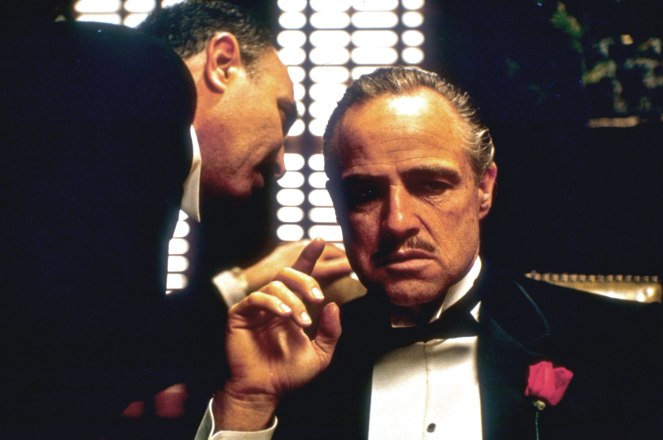
Two secondary themes exist in the score. The first is the infamous ‘love theme’, featured initially in ‘Love Theme from The Godfather’, and later in ‘Apollonia’. This is the 12 note melody that sticks with you the longest, played on strings and plucked guitar for that Sicilian feel, with harp and drum kit accompaniment. It is a beautiful melody, but has a hint of sorrow in it, as if to say that even love cannot escape the mafia. When the theme is introduced with choral accompaniment it always gives me chills. The other secondary theme appears firstly in ‘The New Godfather’, and then in ‘The Godfather Finale’ a 4 note motif that has a conclusive feeling, almost weary. It takes on a more sinister tone in the latter half of ‘The New Godfather’, accompanied by low piano crotchets. ‘The Godfather Finale’ features both secondary themes and also the main theme, each in as Sicilian a rendition as you can imagine, with guitars and strings a-plenty. The tracks conclusion definitely leaves an open ending, anything but conclusive, in the end.
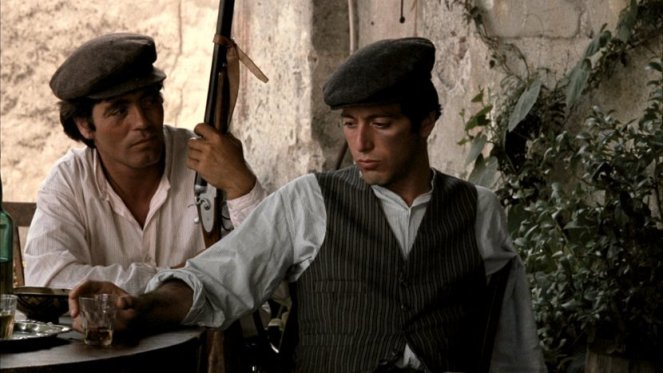
‘The Pickup’ is a highly unique track, featuring a descending string ostinato, counterpointed by a jazzy rhythm from brush snares and piano lines that tinkle up and down with impressive virtuosity and woodwind motifs dotted throughout. When the pace picks up mid-way through the track becomes intensely exciting. ‘Sicilian Pastorale’ is another interesting woodwind (oboe?) solo with minimalistic, unsettling, accompaniment that puts the listener on edge. It acts almost as a lament for the oppressively cruel world of the mafia, where everything can be taken away from you in an instant. ‘The Baptism’ is another highly original organ piece, worked around the structure of the main theme, but with plenty of organ orchestrations to make it seem appropriate for a large Catholic church. It is a spine-tingling listen.

All in all, the score to The Godfather is a nearly perfect fit to the film, with many praise-worthy aspects. The thematic material is memorable, and the orchestrations culturally appropriate (at least to an amateur’s ears). I remember watching the film for the first time, obviously bowled over by the excellence of the whole production, but the music really stuck with me. Unfortunately, this being a product of 1970s recording techniques, the original soundtrack has some clarity issues, especially in ‘The Baptism’. Also, it has to be mentioned that this score was disqualified for Academy Award nomination on the revelation that the ‘love theme’ had been adapted from another work, thus making it not original. Yet, this is still a timeless classic.
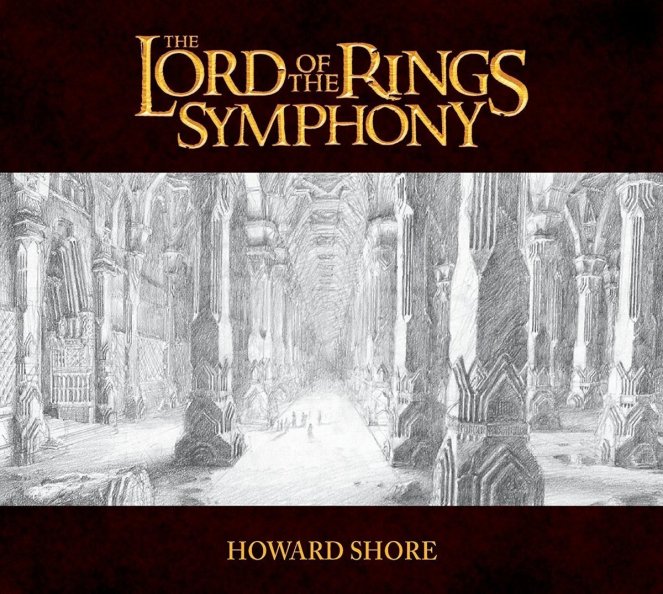
However, when it comes to film scores, there’s a reason why The Lord of the Rings is no. 1. Howard Shore provided us with over 3 hours of music to pore over for these films, and the multiplicity of brilliant motifs, dense orchestrations, dramatic flare of the music and emotional content is staggering. The ‘ring’ motif snakes in the most sinister fashion back and forth, alluding to all the adventure that is yet to come. The ‘shire/hobbits’ theme is endlessly gleeful and fun, the perfect musical picture of rural England. The motifs for Sauron, the Nazgul, and the Uruk-Hai are dark and menacing as can be, featuring fantastic brass and spine-tingling choirs. The motifs for the races of men in The Lord of the Rings are equally brilliant and original – the ‘Rohan’ theme speaks of thundering hooves across the plains of Middle-Earth, while the ‘Gondor’ theme is the embodiment of noble dignity – its rendition in ‘The Lighting of the Beacons’ from Return of the King is one of the most perfect pairings of wordless film and music, as we are treated to sweeping mountainous vistas accompanied by soaring emotional music. Please re-visit my review for this trilogy’s score for a full picture: The Lord of the Rings – Howard Shore
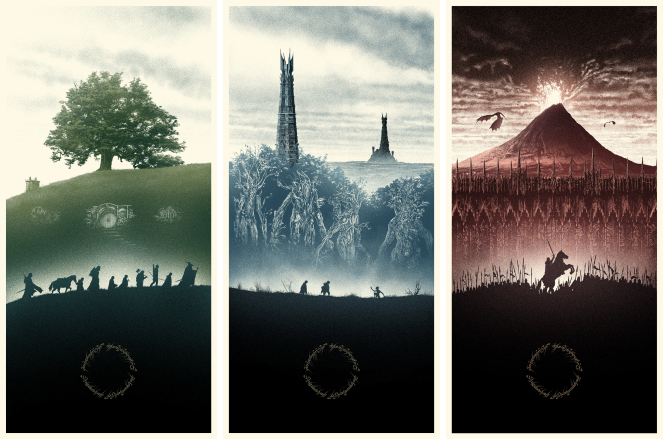
The sheer scale of The Lord of the Rings is amazing, but more than that, Shore’s ability to interweave so many motifs together so that at the right place and the right time we hear statements of motifs to accompany on screen characters, either before us or referenced by another character. Such a dense tapestry of movie music is a task few have dared to properly undertake, a callback to the similarly dense romantic scores of the Golden Age by the likes of Max Steiner and Erich Wolfgang Korngold. There are very few cinematic experiences where you are so obviously aware of the music and its linkage to the dramatic arc of the film – it is so obvious, and yet you don’t mind as a viewer/listener because it is so great! What’s more, the way in which the score is orchestrated and performed makes it prime material for concert adaptations and live performance, and no doubt there would be an army of fans willing to pay to hear this music live. In terms of personal experience (which will ultimately affect the way I rate these scores), I grew up in my secondary school years watching films like The Lord of the Rings, and so I have many childhood memories of the films, the lore, and the music. I have the best memories of listening to it when I went travelling to New Zealand in 2015, the place where Peter Jackson filmed the trilogy.

To me, there is no real contest here. The Lord of the Rings is moving on to the next round. Apologies to all you Godfather fans, I really like the score too, but it just doesn’t hold a candle to Howard Shore’s epic tapestry of music.
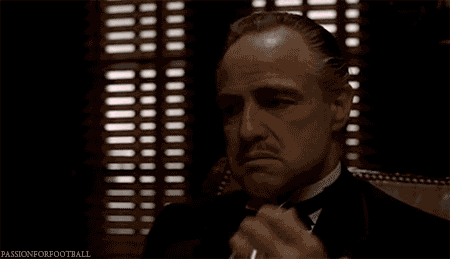
NEXT WEEK: Lawrence of Arabia (#6) vs. Gladiator (#11)